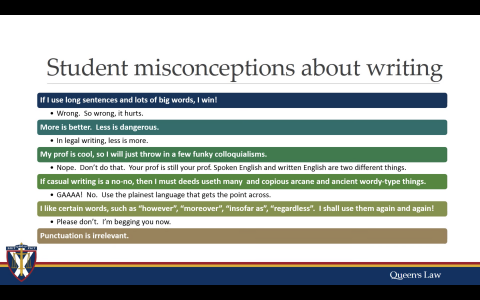
Furthering its strong reputation for preparing law students for the professional world, Queen’s Law is adding a new course to its first-year curriculum this fall: Introduction to Lawyering Skills.
Taught by seasoned lecturers and practicing lawyers, the course is designed as an introduction into the legal profession, and a starting point for building the skills necessary to be a successful lawyer and advocate.
Skills taught in the course will relate to legal professionalism and ethics, the roles of lawyers, judges and the rule of law, legal reasoning and research, legal writing, oral advocacy, and an introduction into basic lawyering skills, such as the progress of a civil action, a primer on evidence (including examination in chief and cross-examination) and client interviewing and counselling.
The course will also have a number of prominent guests speakers. Justice Thomas Cromwell, Law'76, LLD '10, of the Supreme Court of Canada will guest lecture, as well as Dan Pinnington, the Vice President of LawPro, the organization that provides professional liability insurance to lawyers in Ontario. Carolyn Leach, counsel in the Office of the Children’s Lawyer, at least one Superior Court Justice and several local practitioners will round out the guest speakers list.
Four lecturers are teaching the course: Mary-Jo Maur, the Director of the Introduction to Lawyering Skills course, is a family lawyer in Kingston and an Assistant Professor at Queen’s Law; Christa Bracci a faculty member at Queen’s Law and lecturer in legal research; Debra Haak, an insolvency litigation partner at Gowlings LLP in Toronto and a PhD candidate at Queen’s Law; and Hugo Choquette, a teaching fellow and PhD candidate at Queen’s Law.
The course is new approach to teaching law students at Queen’s, as it is being offered in a blended format. 50% of the course information will be delivered online, and the other 50% will be given through plenary lectures and tutorials. In the tutorials, students will have the opportunity to discuss controversial issues in small groups, and participate in role-playing exercises that will build on the online work and lectures.
Students will be assessed through a case brief, a memorandum, a factum, and an oral presentation in a moot format, amongst other smaller exercises.